#Avoiding Punishment
Text


TTRPGs teach Moral Values.
If we look at Kohlberg's Stages of Moral Development, we find players practising and learning these behaviors, values and principles at each stage.
#Kohlberg's Stages of Moral Development#Moral Values#Universal Principles#Avoiding Punishment#Consequences#Learning#Behaviors#Behaviours#Principles#Values#TTRPG#Tabletop#RPGs#Roleplaying Games#Moral Dilemmas
0 notes
Text
Family Trip
Danny loved her, like a sister, a daughter or something in between, but Ellie was happy as long as he was there to take care of her. She felt protected but couldn't stay forever.
She had already explored the whole world, and as interesting as the Infinite Realms seemed in reality they didn't interest her that much. Ellie was sure she needed to go further, but she didn't know how to let Danny know. So she simply told him straight out, that the universe they were in was no longer enough for her.
Danny accepted it, and told her that there were many other universes that she could explore, he told her that Clockwork had told him about some of them. Ellie was excited, she could travel more, but for the first time she hesitated, and realized that she didn't want to travel alone.
She asked Danny if he wanted to travel with her and he gave her the flattest look in existence.
"Obviously I'm going to travel with you" he said. And that was that. No discussion, no questions asked.
They both packed a couple of backpacks as if they were going hiking and asked Clockwork. He just tossed them Dan's thermos before offering them a method of travel. Danny frowned but opened the thermos anyway and dragged Dan with them as he yelled about injustices and upset families.
They ended up in Gotham, in front of a man with a helmet and a guy dressed as a stoplight. Danny waved and asked them for a chat (he probably wanted to ask for directions) while Dan sulked in the back. Ellie looked at the architecture curiously.
Unfortunately for Danny, the stoplight guy pulled out a sword and the helmet guy pulled out a gun. They both looked tense as they looked between the three of them. Danny frowned (his green eyes glinting with annoyance) before nodding towards Ellie and Dan and disappearing.
Thus began their vacation in a world where everyone wanted to shoot them; Danny felt at home, Dan wanted to steal an exotic candy called crypto-something and Ellie was happy to explore.
Their family trip had officially begun.
#dpxdc#immortal danny#Danny has wanted a vacation for a while#Another universe was the perfect choice#Ellie is happy not to travel alone for once#Dan doesn't want to be there#Technically he is reformed but sometimes he has fits of anger and they lock him up as punishment#He doesn't care too much about it#they let him out after he calmed down#But he did not want to participate in the trip#dp x dc#dc x dp#Jason and Damian only saw three floating non-humans with lazarus eyes so they panicked#Dan is definitely going to steal kryptonite just because it looks interesting#and delicious#Danny sees the trip as a family trip and is willing to see all the good places#although he is going to avoid rude people who keep pointing guns at him#Clockwork sent them to the DC dimension on purpose#he hates them for destroying themselves so much and he knows that his pseudo-children are going to give them a headache.
2K notes
·
View notes
Text
Microsoft put their tax-evasion in writing and now they owe $29 billion

I'm coming to Minneapolis! Oct 15: Presenting The Internet Con at Moon Palace Books. Oct 16: Keynoting the 26th ACM Conference On Computer-Supported Cooperative Work and Social Computing.

If there's one thing I took away from Propublica's explosive IRS Files, it's that "tax avoidance" (which is legal) isn't a separate phenomenon from "tax evasion" (which is not), but rather a thinly veiled euphemism for it:
https://www.propublica.org/series/the-secret-irs-files
That realization sits behind my series of noir novels about the two-fisted forensic accountant Martin Hench, which started with last April's Red Team Blues and continues with The Bezzle, this coming February:
https://us.macmillan.com/books/9781250865847/red-team-blues
A typical noir hero is an unlicensed cop, who goes places the cops can't go and asks questions the cops can't ask. The noir part comes in at the end, when the hero is forced to admit that he's being going places the cops didn't want to go and asking questions the cops didn't want to ask. Marty Hench is a noir hero, but he's not an unlicensed cop, he's an unlicensed IRS inspector, and like other noir heroes, his capers are forever resulting in his realization that the questions and places the IRS won't investigate are down to their choice not to investigate, not an inability to investigate.
The IRS Files are a testimony to this proposition: that Leona Hemsley wasn't wrong when she said, "Taxes are for the little people." Helmsley's crime wasn't believing that proposition – it was stating it aloud, repeatedly, to the press. The tax-avoidance strategies revealed in the IRS Files are obviously tax evasion, and the IRS simply let it slide, focusing their auditing firepower on working people who couldn't afford to defend themselves, looking for things like minor compliance errors committed by people receiving public benefits.
Or at least, that's how it used to be. But the Biden administration poured billions into the IRS, greenlighting 30,000 new employees whose mission would be to investigate the kinds of 0.1%ers and giant multinational corporations who'd Helmsleyed their way into tax-free fortunes. The fact that these elite monsters paid no tax was hardly a secret, and the impunity with which they functioned was a constant, corrosive force that delegitimized American society as a place where the rules only applied to everyday people and not the rich and powerful who preyed on them.
The poster-child for the IRS's new anti-impunity campaign is Microsoft, who, decades ago, "sold its IP to to an 85-person factory it owned in a small Puerto Rican city," brokered a deal with the corporate friendly Puerto Rican government to pay almost no taxes, and channeled all its profits through the tiny facility:
https://www.propublica.org/article/the-irs-decided-to-get-tough-against-microsoft-microsoft-got-tougher
That was in 2005. Now, the IRS has come after Microsoft for all the taxes it evaded through the gambit, demanding that the company pay it $29 billion. What's more, the courts are taking the IRS's side in this case, consistently ruling against Microsoft as it seeks to keep its ill-gotten billions:
https://www.propublica.org/article/irs-microsoft-audit-back-taxes-puerto-rico-billions
Now, no one expects that Microsoft is going to write a check to the IRS tomorrow. The company's made it clear that they intend to tie this up in the courts for a decade if they can, claiming, for example, that Trump's amnesty for corporate tax-cheats means the company doesn't have to give up a dime.
This gambit has worked for Microsoft before. After seven years in antitrust hell in the 1990s, the company was eventually convicted of violating the Sherman Act, America's bedrock competition law. But they kept the case in court until 2001, running out the clock until GW Bush was elected and let them go free. Bush had a very selective version of being "tough on crime."
But for all that Microsoft escaped being broken up, the seven years of depositions, investigations, subpoenas and negative publicity took a toll on the company. Bill Gates was personally humiliated when he became the star of the first viral video, as grainy VHS tapes of his disastrous and belligerent deposition spread far and wide:
https://pluralistic.net/2020/09/12/whats-a-murder/#miros-tilde-1
If you really want to know who Bill Gates is beneath that sweater-vested savior persona, check out the antitrust deposition – it's still a banger, 25 years on:
https://arstechnica.com/tech-policy/2020/09/revisiting-the-spectacular-failure-that-was-the-bill-gates-deposition/
In cases like these, the process is the punishment: Microsoft's dirty laundry was aired far and wide, its swaggering founder was brought low, and the company's conduct changed for years afterwards. Gates once told Kara Swisher that Microsoft missed its chance to buy Android because they were "distracted by the antitrust trial." But the Android acquisition came four years after the antitrust case ended. What Gates meant was that four years after he wriggled off the DoJ's hook, he was still so wounded and gunshy that he lacked the nerve to risk the regulatory scrutiny that such an anticompetitive merger would entail.
What's more, other companies got the message too. Large companies watched what happened to Microsoft and traded their reckless disregard for antitrust law for a timid respect. The effect eventually wore off, but the Microsoft antitrust case created a brief window where real competition was possible without the constant threat of being crushed by lawless monopolists. Sometimes you have to execute an admiral to encourage the others.
A decade in IRS hell will be even more painful for Microsoft than the antitrust years were. For one thing, the Puerto Rico scam was mainly a product of ex-CEO Steve Ballmer, a man possessed of so little executive function that it's a supreme irony that he was ever a corporate executive. Ballmer is a refreshingly plain-spoken corporate criminal who is so florid in his blatant admissions of guilt and shouted torrents of self-incriminating abuse that the exhibits in the Microsoft-IRS cases to come are sure to be viral sensations beyond even the Gates deposition's high-water mark.
It's not just Ballmer, either. In theory, corporate crime should be hard to prosecute because it's so hard to prove criminal intent. But tech executives can't help telling on themselves, and are very prone indeed to putting all their nefarious plans in writing (think of the FTC conspirators who hung out in a group-chat called "Wirefraud"):
https://pluralistic.net/2023/09/03/big-tech-cant-stop-telling-on-itself/
Ballmer's colleagues at Microsoft were far from circumspect on the illegitimacy of the Puerto Rico gambit. One Microsoft executive gloated – in writing – that it was a "pure tax play." That is, it was untainted by any legitimate corporate purpose other than to create a nonsensical gambit that effectively relocated Microsoft's corporate headquarters to a tiny CD-pressing plant in the Caribbean.
But if other Microsoft execs were calling this a "pure tax play," one can only imagine what Ballmer called it. Ballmer, after all, is a serial tax-cheat, the star of multiple editions of the IRS Files. For example, there's the wheeze whereby he has turned his NBA team into a bottomless sinkhole for the taxes on his vast fortune:
https://pluralistic.net/2021/07/08/tuyul-apps/#economic-substance-doctrine
Or his "tax-loss harvesting" – a ploy whereby rich people do a "wash trade," buying and selling the same asset at the same time, not so much circumventing the IRS rules against this as violating those rules while expecting the IRS to turn a blind eye:
https://pluralistic.net/2023/04/24/tax-loss-harvesting/#mego
Ballmer needs all those scams. After all, he was one of the pandemic's most successful profiteers. He was one of eight billionaires who added at least a billion more to his net worth during lockdown:
https://inequality.org/great-divide/billionaire-bonanza-2020/
Like all forms of rot, corruption spreads. Microsoft turned Washington State into a corporate tax-haven and starved the state of funds, paving the way for other tax-cheats like Amazon to establish themselves in the area. But the same anti-corruption movement that revitalized the IRS has also taken root in Washington, where reformers instituted a new capital gains tax aimed at the ultra-wealthy that has funded a renaissance in infrastructure and social spending:
https://pluralistic.net/2023/06/03/when-the-tide-goes-out/#passive-income
If the IRS does manage to drag Microsoft through the courts for the next decade, it's going to do more than air the company's dirty laundry. It'll expose more of Ballmer's habitual sleaze, and the ways that Microsoft dragged a whole state into a pit of austerity. And even more importantly, it'll expose the Puertopia conspiracy, a neocolonial project that transformed Puerto Rico into an onshore-offshore tax-haven that saw the island strip-mined and then placed under corporate management:
https://pluralistic.net/2022/07/27/boricua/#que-viva-albizu

If you'd like an essay-formatted version of this post to read or share, here's a link to it on pluralistic.net, my surveillance-free, ad-free, tracker-free blog:
https://pluralistic.net/2023/10/13/pour-encoragez-les-autres/#micros-tilde-one


My next novel is The Lost Cause, a hopeful novel of the climate emergency. Amazon won't sell the audiobook, so I made my own and I'm pre-selling it on Kickstarter!
#pluralistic#irs#puerto rico#puertopia#microsoft#micros~1#tax avoidance#tax evasion#pure tax play#big tech can't stop telling on itself#corporate crime#rough ride#the procedure is the punishment#steve ballmer#pour encouragez les autres
898 notes
·
View notes
Text
What if Good Omens were about two women (and no, don’t try me with that whole “they’re not technically men/they’re women sometimes“ deal. Yes, it is strictly speaking true, but it’s incredibly hard to tell when they’re being women on screen and they’re men most of the time)
What if IWTV were about two women
What if OFMD were about two women
What if all of these Tumblr darling shows were about women with sapphic romance or sexual tension. Cis women, trans women, women of various ages and races and classes and abilities
What if genre media about queer women got the same love from its showrunners and from fans alike that genre shows about M/M couples get now. What if that trend hadn’t briefly flared into glorious light in the 2010s and then died again
Damn I might actually watch those shows then
#it’s nobody’s fault but I’m just so fucking sick of every single show that gets popular enough to have a major fandom#being All About Men#to the point where I don’t even hear that much about the female characters who are present#did we get too comfortable in the age of Carmilla and Wynonna Earp and orphan black?#did we get too used to having nice things that need to be punished for it?#*and need#yes WE & OB are doing spin offs but I’ve heard next to nothing about them except that they aren’t as good as the originals#motherland: Fort Salem kind of belonged to that era but came out too late to be part of it#and as far as I can tell avoided getting major fandom traction
160 notes
·
View notes
Text
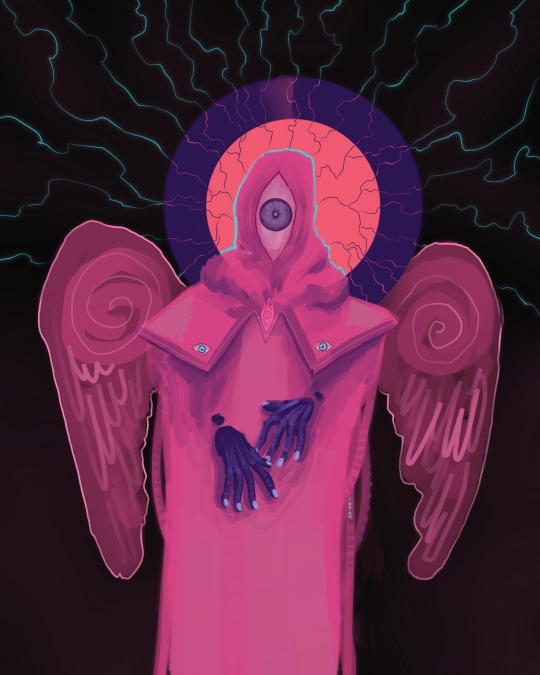
Pain. Death. Suffering.
#migraine. ow#drawing#artists on tumblr#illustration#procreate#digital art#my art#angel of stabbing pain through my eyesocket skull & spine#also nausea#and punishment for not avoiding gluten enough. but i think that ones unrelated.
230 notes
·
View notes
Text
AU where Loki doesn’t interfere with Thor’s banishment at all and it takes Thor years to prove himself worthy and when he returns to Asgard everything is just. The same. Nothing seems to have changed at all and everyone greets him like his absence was a minor obstacle that didn’t fundamentally change Thor and the worst part is Loki stepped down from the place as regent without any delay and Thor can’t help but feel there’s something underlaying the way his brother looks at him now and won’t let him touch him and Thor doesn’t know what he could have missed because he doesn’t think he would have found anything wrong with the things around him and how everyone behaves if he hadn’t spent time on Earth reflecting.
#the warriors 4 not being interested in anything Thor ‘learnt’ at all#and making it clear that Thor was punished unfairly and the AllFather’s decision had been harsh#Loki saying he’s happy for Thor and Thor sees the way the smiles are forced and he sees the way Loki avoids any touch#Thor hating the way Frigga talks about Loki’s short regency and Thor’s absence like it wasn’t two whole decades or something#like she’s so grateful to have her other son back without ever addressing why he was gone#Thor just. growing during his time on earth and being much more aware of the behaviour around him#he learns to be critical and assess why people around him may act a certain way#once he realises that it’s possible for him or anyone else to be fallible and make mistakes it’s over for Asgard for him I think#Thor returns and Loki gives him the throne and everyone expects him to obviously have the throne#and Odin is sleeping and Thor isn’t comfortable with the way everyone accepts him as king regent after the banishment#Loki who either never lashed out against Jotunheim or did and it was brushed away and no one thinks about it as anything#but Loki is still deeply affected and acts the way he always would have but Thor can feel it’s not the same#he knows something is wrong and Loki won’t say anything about it and Thor doesn’t know how to bring it up#Thor sees Loki metaphorically receding into the shadows to become a nonpresence so loud Thor hears it even after returning from decades away#Thor goes to Earth and gets his priorities in order gets a new worldview learns not to take what he has for granted#and finds out he actually despised Asgard#he’s been back a week and he can’t stand it
414 notes
·
View notes
Note
Do you think Mac has jacked off while reading the Bible? Or is he too ashamed? Or does the shame just turn him on more? Are the pages of his Bible all stuck together?
Oh, I don't think; we know:




(Pages stuck together, thanks for the confirmation, Charlie)
I think the shame definitely turns him on more, considering Mac Day:




And, the connected punishment, lest we forget The Gang Goes to Hell... (and the script here... whew)



While he was repressed then, he wasn't as of Charlie's Home Alone, so I think it's clear to claim that a part of his "homosexual awakening" was connected to the fact that he was gradually getting more and more into the idea of being punished (gone sexual) for his sins, to a point where he was just genuinely jerking off to the "evils of homosexuality"
I do wanna continue here though and say Season 15 is pretty interesting because we see Mac battle between being Catholic and proudly gay. He seemingly has no issue bragging to a Priest in the middle of a church that he's into triple penetration, but it is his sex life that is the driving "reasoning" for why he thinks he should become a Catholic Priest:


He's been "S-ing&F-ing" his way though life for too long and now he thinks God has taken away one of his identities (Irish) as a result. Mac's idea of being punished by/for God continues, but it's now through the form of revocation (as opposed to shame or flagellation). I think there's a clear "connect the dots" idea that depriving himself of sex (via becoming a Priest) is an "evolved" form of allowing God to punish him for being gay.
Obviously Mac learns he was lied to, as he actually is Irish, so his "journey" here is a bit of a wash, but the fact that his rationale jumped to God punishing him for having gay sex still stands. As he grows to accept himself, he's still looking for ways to feel shame (which, as we've seen, gets him off)...
But is the constant seeking for some form of punishment still there? We didn't see much of his Catholicism in Season 16 (I think the only mention of God from Mac was in The Gang Gets Cursed), but we did continue to see his sex life and—well, that was pretty heavy on Mac, openly gay dating, somehow managing to be neglected and deprived of actual gay sex, wasn't it?
#by the golden god no less..#mac mcdonald#iasip#main tagging it why not this is analysis to me#mac meta#ask#also i rewatching sinks in a bog while answering this and#damn the little 'thats what he said' jokes between mac and gus were cute... give him a boyfriend RCG meahesrshhhh#only for an episode tho so dennis can get jealous#ah im seeing myself in my own shitpost#thanks for the ask i doubt this went the way you thought but oh well lol#also.. idk how much of mac's gayness is like. rob avoiding being gay on screen tbh#but this is simply analysis of the character and my interpretation#idk if this is rob's actual intent.#but i like to think he does care about mac's struggle between enjoying being gay while feeling like he HAS to be punished for being gay#ok deep in the tags now cos i cant stfu#hohc kinda hurts this idea that mac gets off to being called a fag lol#but i do have to wonder if there was a point where he did#like prior to his actual gay acceptance and awakening#idk.. lol whatever.. interesting interesting
67 notes
·
View notes
Text
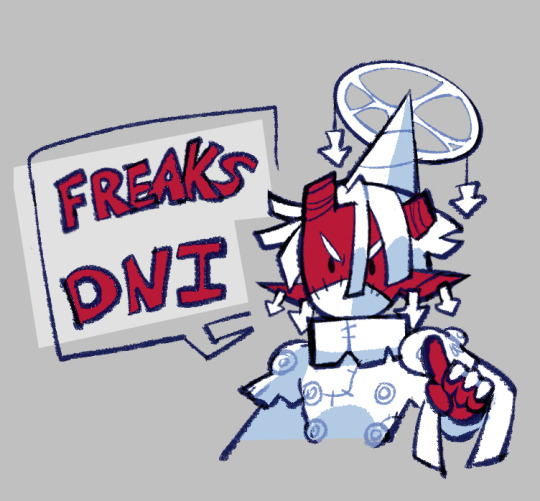
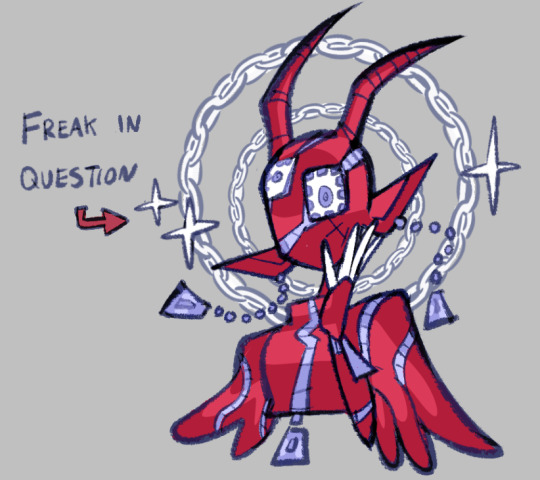
They're both so insane for different reasons but it results in the same outcome
#oncoming rambles in tags sorry#Curser wants to be an angel so badly that she despises other angels she deems as unworthy#stealing angel skin for her larping outfit and swearing to enact her twisted version of justice#like shes only a demon so her idea of whats good and wrong is based upon all she was taught in hell#where it prioritizes avoiding sin rather than committing good actions#so she is hyperfocused on punishing those she deems as sinners according to her ethical code.#And Zip is fascinated by concepts of pain and physical attraction which angels are unable to experience#And so often those sensations are associated with sin so it feel closer to it#It dons demon skin garb#my ocs#angel oc#file recovery
572 notes
·
View notes
Text
Whumper forces Whumpee to punish themself when they break a rule; kneeling on rice or glass, maintaining a stress position, even using whatever object happens to be within reach to inflict pain. Eventually, Whumper doesn’t have to tell them to do it. It becomes a programmed response to Whumper’s disapproval—the slightest frown, a pinched brow, a warning tilt of the head.
When Whumpee is rescued, Caretaker has to learn this the hard way.
#not a good surprise for Caretaker#now they have to learn and avoid every subtle motion that will set Whumpee off#Whumpee thinking they must not be doing enough since their self-punishments aren’t pleasing Caretaker#seeing Whumper’s micro-expressions in every stranger’s face#whump
206 notes
·
View notes
Text
i like thinking about how all the versions of frank i know are so gentle with civilians in a certain way. its always "it was my pleasure", "youre safe im not going to hurt you" and "just stay still youre fine" while hes defusing an actual bomb. its always we cant shoot at the strip club because the workers are going to get injured and we cant have that above most else. the punisher is big and scary and kills people without a second thought but if you didnt ask to be there and are just a regular guy wrapped up in situations way beyond you he is also so gentle and its driving me insane
#marvel#frank castle#the punisher#i had a day of going insane today over him btw#i spent like an hour laying in bed with my giant teddy bear just yearning#AND YK WHAT when he doesnt let people tag along its not just because hes an edgy asshole and theyll bother him#but also bc if they tag along theyre just more likely to get hurt!! and thats like the thing hes doing his best to avoid!!!#man cant blow up a ship because a whole TWO innocents are on board so this is a rescue mission now above most else#idk. i like it. hes an antihero cuz he kill people sure but dont come at me with some fucking 'oh he doesnt care to save people' shit#cuz he does even if he may not admit it verbally
125 notes
·
View notes
Text
"Murder is Werewolves" - Batman
I don't got the SPOONS to do this thought train justice, I have seriously been trying to write this thing for MONTHS so just, idk, have this half baked skeletal outline of the essay I guess:
I don't believe that Batman's no-kill rule is primarily about rehabilitation or second chances.
His refusal to believe that Cassandra could have killed someone when she was eight years old because "how could a killer understand my commitment not to kill" is absolute fucking MOON LOGIC from a rehabilitationist standpoint. No jury on the planet would think for even a second that she could reasonably be held accountable for her actions in that situation! Her past cannot condemn her to being incapable of valuing human life under a rehabilitation centering framework. However, Batman's reasoning makes perfect sense if he believes that killing is a spiritually/morally corrupting act which permanently and fundamentally changes a person, and that corruption can never be fully undone.
Dick Grayson killing the Joker is treated both narratively and by Batman as an unequivocally WIN for the Joker. The Joker won by turning Nightwing into a killer. Note that this is during a comic in which the Joker transforming people was a major theme! Batman didn't revive the Joker because the Joker deserved to live; he revived the Joker to lift the burden on Dick.
His appeal to Stephanie when she tried to kill her dad is that she shouldn't ruin her own life. He gives no defense of Cluemaster's actual life. Granted this is a rhetorical strategy moment and should be taken with a generous pinch of salt, but it fits in the pattern.
When Jason becomes a willful killer, he essentially disowns him, never treats him with full trust ever again, and... Well, we can stop here for Bruce's sake. Bottom line is that his actions towards Jason do not lead me to believe that he thinks Jason can become a better person without having his autonomy taken from him, either partially or fully.
The Joker is, for better or worse, the ultimate symbol and vessel of pure, irredeemable evil in DC comics now. He hasn't been just another crook in a long time. He will never get better, he will only get worse. If you take it to be true that the Joker will not or can not rehabilitate, then there's no rehabilitationist argument against killing him.
Batman does not seem to consider it a possibly that he'll rehabilitate. Batman at several points seems to think that the Joker dying in a manner no one could have prevented would be good. Yet Batman fully believes that if he killed the Joker, he himself would become irredeemable.
Batman's own form of justice (putting people into the hospital and then prison) is fucking brutal and clearly not rehabilitative. He disrespects the most basic human rights of all criminals on a regular basis. It is genuinely really, really weird from a rehabilitationist standpoint that his only uncrossable line is killing... But it makes perfect sense if he cares more about not corrupting himself with the act of killing than the actual ethical results of any individual decision to kill or not kill.
In the real world cops are all bastards because they are too violent to criminals, even when that violence doesn't lead to death. Prison is a wildly evil thing to do to another human being, and you don't use it to steal away massive portions of a person's life if your goal is to rehabilitate them. In the comic world, Batman is said to be necessary because the corrupt cops are too nice to criminals and keep letting them out of jail. I don't know how to write a connector sentence there so like I hope you can see why this bothers me so damn much! That's just not forgiveness vibes there Batman!!
I want to make special note here of the transformative aspect. You don't simply commit a single act when you kill, no, you become a killer, like you might become a werewolf.
The narrative supports this a lot!
Why did Supes go evil during Injustice? He killed the Joker. Why did Bruce become the Batman Who Laughs? Bruce killed the Joker. Why was Jason Todd close to becoming a new Joker during Three Jokers? Because he killed people, to include the Joker.
Even if these notions of redemption being impossible aren't the whole of his reasoning (people never have only one reason for doing what they do) it is a distinct through-line pattern in his actions and reasoning, and it is directly at odds with notions of rehabilitation, redemption, and second chances.
So why does he give so many killers second chances?
Firstly because this doesn't apply to all versions of Batman. Some writers explicitly incorporate rehabilitation and forgiveness into his actions. You will be able to provide me with examples of this other through-line pattern if you go looking for them. The nature of comics is to be inconsistent.
Secondly the existence of that other pattern does not negate the existence of this one. People and characters are complex, and perfectly capable of holding two patterns of belief within themselves, even when they conflict to this degree. You can absolutely synthesize these two ideas into a single messy Batman philosophical vibescape.
Finally and most importantly to this essay: he has mercy on killers the same way that werewolf hunters sometimes have mercy on someone who is clearly struggling against their monsterous nature, especially if they were turned in exceptional circumstances or against their will. They understand that they are sick, damned beasts, cursed to always be fighting against themselves and the evil they harbor within. It is vitally kind to help them fight themselves by curtailing their autonomy in helpful ways and providing them with chances to do some good to make up for their eternal moral deficiency.
I think in many comics Batman views killers as lost souls. Battered and tormented monsters who must be pitied and given mercy wherever possible. (The connections to mental health, addiction, and rampant, horrifying ableism towards people struggling with both is unavoidable, but addressing it is sadly outside of the scope of this essay.)
Above all, the greatest care possible must be taken to never, ever let yourself become one of them, because once you have transformed the beast will forever be within you growing stronger.
To Batman, it is the most noble burden, the highest mercy, the most important commandment: Thou shalt suffer the monsters to live.
#batman#batman negative#batsalt#okay hopefully that will let peeps who don't wanna see me rant against bats avoid this?#i could write several books on the moral and ethical philosophies at play in the Batfam tbh#I'm like kinda mostly happy with this#pretty good for being slammed out in three hours while baking brownies#inspired muchly by my friend's talk about Batman acting in accordance with Presbyterian predestination#and how he is one of the most carceral of all superheroes#all people merely revealing through their actions what sort of person they already are#punishing them in the hopes they can suffer enough penance on earth to escape hell#how that can look like rehabilitation or redemption at a glance#but functions in a fundamentally different way#anyway hope this mess was an interesting read!#damian's tomfoolery
225 notes
·
View notes
Text
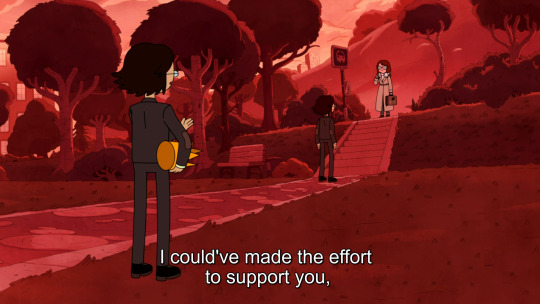
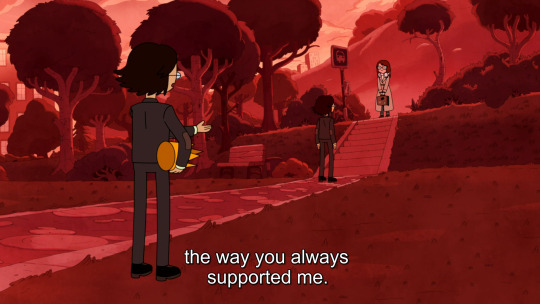

Simon, what the hell are you talking about?
You didn't mean to find the crown, neither did you know what was gonna happen when you put in on 😨😑 this isn't some weird karmic punishment from the universe, it was completely out of your control. Do you tell someone who got into a car crash that if they were "just a little less selfish" they wouldn't have gotten into that car and have that RANDOM TRUCK CRASH INTO THEM because somebody else was drink driving????? Why talk about pointless what-ifs when you're talking about unalterable life events?
This is just so bizarre. Ignoring the fact that 'selfishness' is not a flaw Simon Petrikov has, why not choose to demonstrate "selfishness" with like, Simon actually making a selfish choice? Maybe Betty becomes sad from a heavy life event, and Simon experiences a smaller sadness like being laughed at by his coworkers, and Simon asks Betty to comfort him, and then Simon forgets to ask Betty about her day?
I mean, I wouldn't write this anyway because "selfishness" is not a flaw Simon needs to overcome, but anything would've been better than "Simon only had two choices, ask Betty to stay with him, or forget about her so she could go on the bus trip". There's options???? They can stay in touch and write to each other? Besides, it would only be inconvenient to Betty if Simon just invited himself on her trip with no tickets and no luggage.
Geezalou... 🙈
#Simon petrikov#adventure time#ice king#simon petrikov#betty grof#Fionna and cake#AT#AT critical#Adventure time criticism#AT salt#Adventure time critical#What a bizarre and unhealthy message to give to your audience#Yes keep obsessing and punishing yourself for not making a different choice and avoiding the dreaded butterfly effect#It's totally your fault for tripping over and destroying the universe
189 notes
·
View notes
Text
Grim Reaper
The moment he gained consciousness as he emerged from the Lazarus pits, Jason noticed a curious thing: A shadow was always following him, waving with happiness, even though it was rather threatening in his opinion.
At first, the shadow looked harmless, greeting him and hiding most of the time, almost like they were friends. But when Jason returned to the streets of Gotham and killed the first person he considered "bad" as Red Hood, his "friend" came out of the shadows and revealed his identity: Death.
Jason was sure it was Death, with the scythe in his hands, his black hood up and his green eyes judging him completely serious (he even saw him collect the soul of who he had killed!). At that moment he knew that he had made a mistake and began to escape from it. He wasn't going to die a second time, and death was not going to catch him. This of course, started some kind of supernatural persecution in Gotham.
But contrary to what Jason thought, the Grim Reaper wasn't trying to kill him. Danny was actually trying to prevent Jason from becoming a Grim Reaper like him, this being one of the worst punishments in his opinion.
Many years ago, the Observants punished him probably in an attempt to prevent his fate as Dark Dan after the death of his family. For what reason was this punishment assigned to him? Killing everyone associated with the G.I.W. Danny considered what he did fair, they had attacked and he had responded.
In his opinion they deserved no mercy, not after what they did to his family and friends, not after what they did to Amity.
But his thirst for blood and revenge only got him so far. After leaving that bloodbath behind, the ghosts told him that the Observants were waiting for him in the Realms; When he arrived they gave him a punishment for his actions by assigning him as a "Grim Reaper" supposedly to "teach him the value of life" he still thought it was absurd, it's not like they knew it themselves.
But when he saw his own mentor looking at him sadly he accepted. He was immortal, it's not like he had much to do. But the duty of a Grim Reaper was arduous, exhausting and sad, Danny didn't want anyone else to go through it. That's why when he heard that another immortal could be punished just like him, he rushed to meet him and try to avoid it.
But he had spent so much time alone that he didn't know how to approach, he had forgotten his humanity and only knew Esperanto! How was he going to keep Jason from getting lost in the path of blood and vengeance if he couldn't talk to him? He even tried to smile but the guy looked terrified!
Other than that, Jason kept running away every time he saw him, was it impossible to stop him from turning into a Grim Reaper like him!?
#dpxdc#Danny is the Grim Reaper#it's some sort of punishment for him#Jason is destined to become a Grim Reaper too#If he doesn't change his path#Danny is trying to help him avoid that destiny#but misunderstandings arise#and everything is a mess between the two#dp x dc#dc x dp#dp x dc crossover#dp x dc prompt#Jason is confused#He thinks Death is coming for him#And he doesn't want to die again#That's the reason he escape#Danny uses a scythe#He still need to do his work as a Grim Reaper#Collect souls and all#He is not trying to threat anyone tho#The scythe is cool#But Jason thinks otherwise#He is sure Danny is trying to collect his soul#Jason doesn't know he is immortal#or his destiny#grim reaper
604 notes
·
View notes
Text
forgive the brief jesus chris superstar rant but. there is a very important difference between the pharisees being villains and the pharisees being antagonists. they're technically antagonists because they're actively working against the interests of our protagonist, but i don't believe they should ever be played as villains. they're not evil or bad or wrong. they're terrified just like literally everyone else in the show is, and their actions are completely justified. to me that's the entire point of the musical. it's not about christianity; it's about the impact the roman empire's brutal and violent imperialism had on everyone on all levels. including jesus and judas, but also including the pharisees, and even herod and pilate. when a powerful coloniser forces their presence on innocent people they are the only winners. everyone else suffers, even the puppet kings and high priests who look like they're reaping some sort of benefit from it all. that's roman propaganda. the romans kept native rulers like herod and caiaphas in power to maintain the illusion of provincial autonomy, and keep populations appeased and therefore under control. everyone in the show is acting out of fear of the romans. the one roman character we do see (pilate) is acting out of fear of his own emperor. it makes no sense to cast the pharisees as two dimensional Bad Guys, especially when the same productions that do that usually offer a sympathetic portrayal of pilate. it would be so easy to stage and direct a production in a way that makes it obvious that the pharisees are doing what they're doing because they truly have no choice, and not because they're pure evil and want to kill jesus for the sake of it. it's not only an antisemitic trope but also undermines a really important theme of the musical. if you can see the humanity in the violent roman governor installed forcefully on conquered land then you can afford some humanity for the pharisees too. they are victims of pilate and victims of rome just like everyone else
#THEY ARE NOT ALLIES OF PILATE. they have a common interest yes. ie avoiding punishment from rome#but the pharisees have no choice but to go to pilate. they have no real power. because like i said. they are puppet rulers#i am just tired of seeing the pharisees as villains#IF YOU WANT A VILLAIN (idk why you need to have one i don't think this show is about that) IT SHOULD BE FUCKING PILATE. AND NO ONE ELSE#THE PHARISEES ARE NOT VILLAINS. THEY ARE NOT EVIL. THEY ARE VICTIMS.#i am tired of seeing them costumed or directed in a way that makes them stereotypical Bad Guys#the 2k version of jcs is my favourite but i HATE how it portrays the pharisees at times especially annas#when annas pushes judas to the floor for literally no reason it's like. you are going out of your way to make these guys seem evil#sucks because the actor from 2k is the best annas i've ever seen in terms of presence and voice#and the actor who plays caiaphas in that film does a really good job at showing fear instead of pure anger and evil#but it's generally all still done in a way that makes the priests seem evil. in my opinion#and yes i called pilate violent. he's not in A Lot of productions but. the real pilate was an extremely brutal governor#and there's a very good reason for portraying him as such. especially when you consider the themes i mentioned here#jesus christ superstar#jcs#ask to tag
271 notes
·
View notes
Text
want sir to shove my face into a superior woman's cunt and they tell me real women get their pussies eaten by dumb sluts and I better do a good job or I'll have to eat her ass too (I was always going to eat her ass, they just like to pretend to offer options)
#corruption kink#gaslighting kink#tell me if i do a good job i won't be punished#straight up lie to me#then laugh at me during whatever punishment you promised i could avoid
54 notes
·
View notes
Text
“The Holocaust was real and antisemitism is real, but it doesn’t give Jews the right to then be the oppressor.”
—Shatzi Weisberger
#politics#palestine#gaza#israel#shatzi weisberger#zionism#war crimes#collective punishment#israel is an apartheid state#genocide#anti zionisim#never again#never again to anyone#human rights#jewish voice for peace#israel is actually committing a genocide against palestinians and no one is doing anything to help them#i purposely avoid using the word zionist bc its sometimes a dog whistle but it was important here#not to edit the speakers words#anti zionism ≠ antisemitism
237 notes
·
View notes